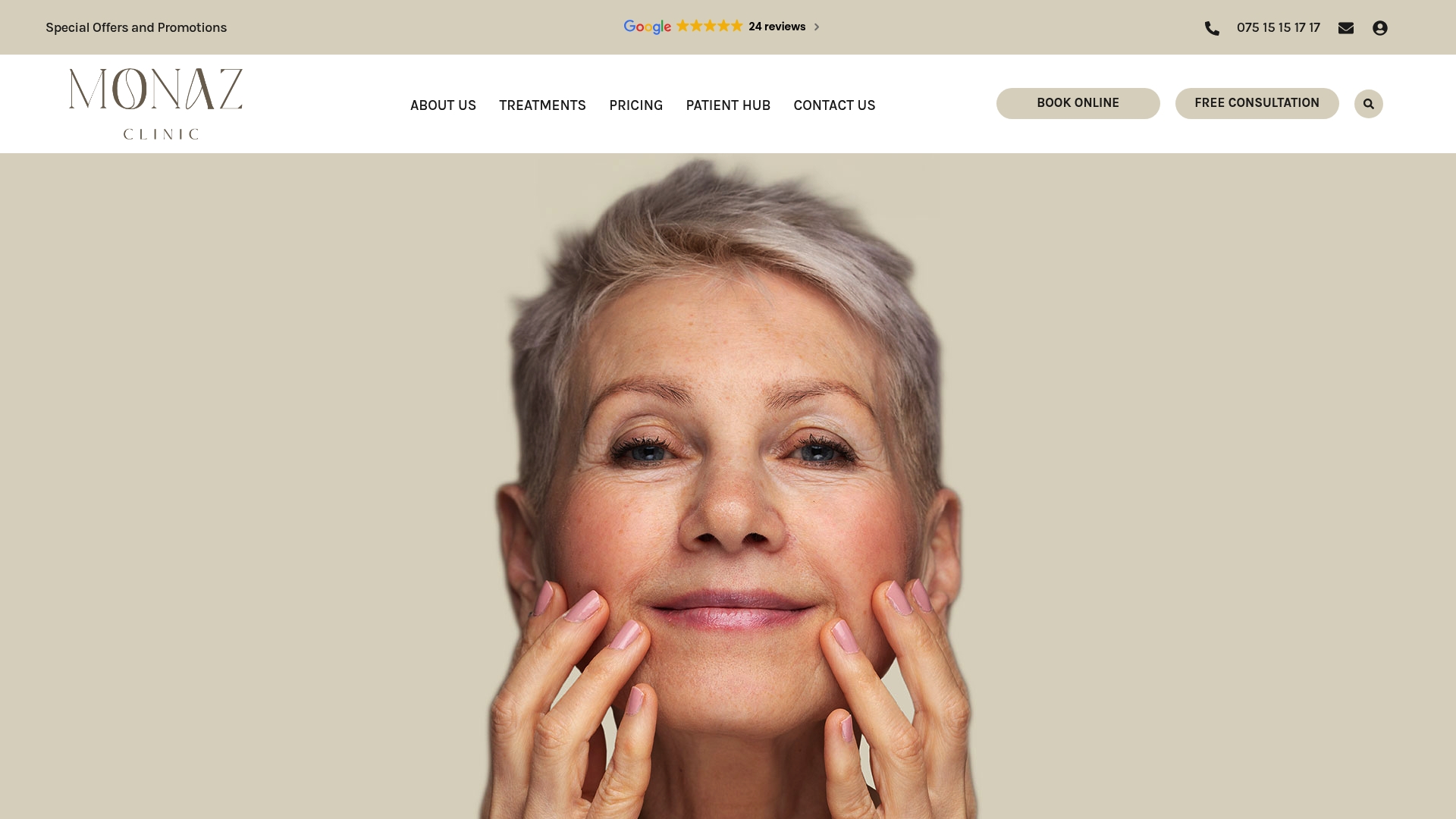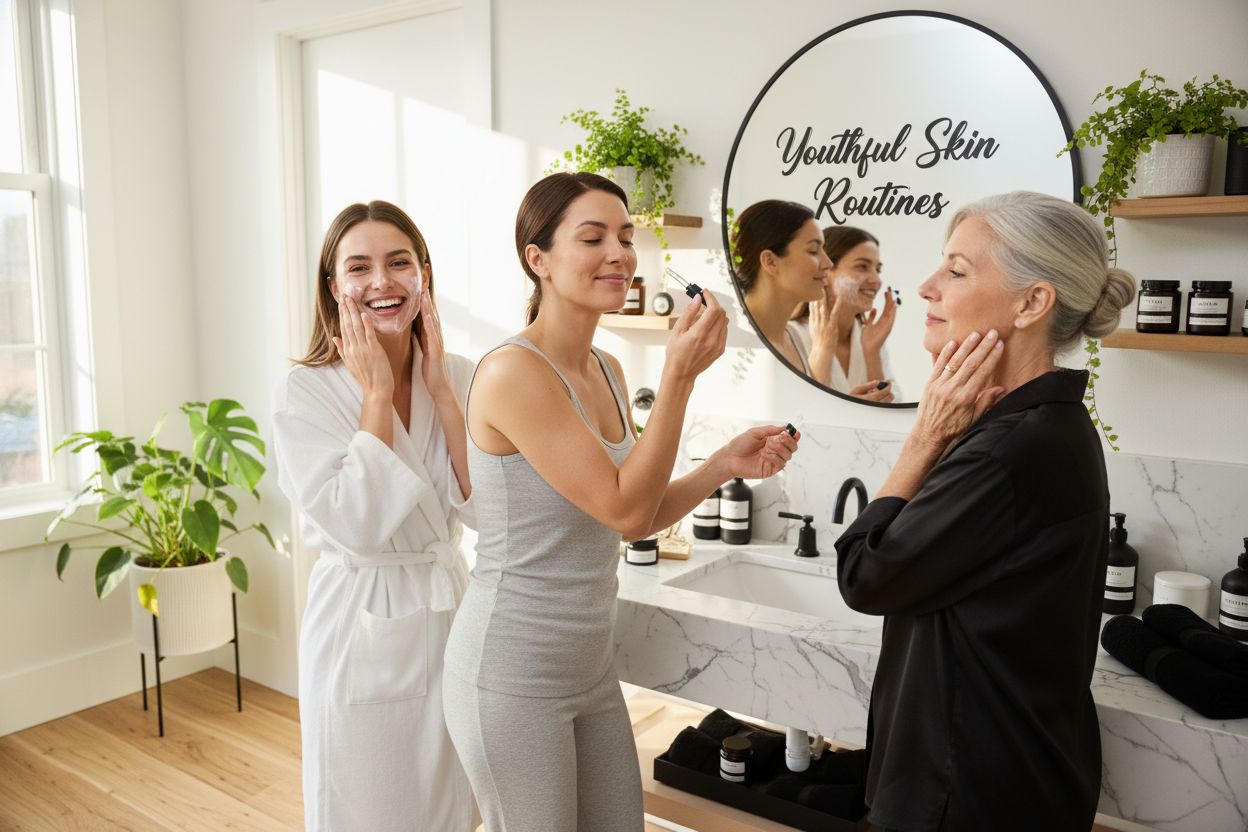Explore youthful skin routines to achieve glowing skin. Understand their importance, how they work, and key concepts for skincare success.
Active skincare routines are seeing a surge in popularity as more people look for ways to keep their skin glowing and strong at any age. It might sound simple, just washing and moisturising every day. Only, the science goes much deeper. Research from the International Dermatology Institute shows cellular metabolism and collagen production are at the heart of real skin health changes. Most people think youthful skin is about fighting wrinkles but in reality it is about building a routine that supports your body’s own protective systems from within.
Table of Contents
- What Are Youthful Skin Routines And Their Purpose?
- Why Youthful Skin Matters: The Impact Of Ageing
- How Skin Functions: The Science Behind Skin Health
- Key Concepts In Youthful Skin Routines
- Real-World Applications Of Youthful Skin Routines
Quick Summary
| Takeaway | Explanation |
|---|---|
| Personalise your skincare routine | Tailor your skincare approach to individual skin needs, considering genetics and environmental factors. |
| Focus on hydration and protection | Ensure your routine prioritises maintaining skin hydration and protecting against environmental damage. |
| Incorporate scientifically validated products | Use high-quality skincare products backed by research for optimal results in skin health. |
| Monitor and adjust your routine regularly | Evaluate your skincare regimen frequently and adapt it according to your skin’s changing needs and lifestyle. |
| Understand the science of skin aging | Recognise the processes of skin aging to better mitigate signs and enhance overall skin vitality. |
What Are Youthful Skin Routines and Their Purpose?
Youthful skin routines represent a strategic approach to skincare that focuses on maintaining and enhancing skin health during various life stages. These routines go beyond basic cleansing and moisturising, targeting specific skin needs while preventing premature ageing and supporting long-term skin vitality.
Understanding the Core Philosophy
A youthful skin routine is fundamentally about proactive skin management. It recognises that skin health is not static but dynamic, requiring tailored strategies that adapt to changing environmental conditions, hormonal shifts, and natural ageing processes. Learn more about personalised skincare approaches that can help you develop a comprehensive skin protection strategy.
Key objectives of youthful skin routines include:
- Protecting skin from environmental damage
- Supporting natural cell regeneration
- Maintaining optimal hydration levels
- Preventing early signs of ageing
Scientific Foundations of Skin Health
Modern dermatological research highlights the importance of understanding skin as a complex biological system. According to research from the International Dermatology Institute, effective skin routines must address multiple factors simultaneously.
These routines consider critical elements such as cellular metabolism, collagen production, and oxidative stress management. By integrating scientifically validated techniques and high-quality skincare products, individuals can create personalised approaches that support skin resilience and appearance.
The ultimate goal of youthful skin routines is not about achieving unrealistic perfection but promoting sustainable skin health that reflects natural beauty and individual wellness.
Why Youthful Skin Matters: The Impact of Ageing
Ageing represents a complex biological process that significantly transforms skin structure, appearance, and functionality. Understanding these transformations helps women develop strategic skincare approaches that mitigate potential aesthetic and health challenges associated with natural skin changes.
Biological Mechanisms of Skin Ageing
Skin ageing occurs through intrinsic and extrinsic mechanisms that progressively alter cellular dynamics.
 Learn more about wrinkle prevention strategies that address these fundamental biological processes.
Learn more about wrinkle prevention strategies that address these fundamental biological processes.
Key physiological changes include:
- Reduction in collagen and elastin production
- Decreased cellular regeneration capacity
- Diminished natural hydration mechanisms
- Increased oxidative stress vulnerability
Visible and Functional Consequences
According to dermatological research published in Nature, skin ageing manifests through multiple interconnected transformations. Cellular metabolism slows, resulting in:
- Increased fine lines and wrinkle formation
- Reduced skin elasticity
These changes are not merely cosmetic but represent complex biological shifts with broader health implications. Skin serves as a protective barrier, and its functional integrity directly impacts overall physiological resilience.
The following table summarises the main biological mechanisms driving skin ageing and their corresponding visible and functional consequences, helping readers connect scientific changes to real-world skin concerns.
| Mechanism | Biological Description | Visible/Functional Consequences |
|---|---|---|
| Collagen and elastin reduction | Decreased production of structural proteins | Formation of fine lines and wrinkles |
| Diminished cellular regeneration capacity | Slower turnover of new healthy skin cells | Reduced skin elasticity and vitality |
| Hydration mechanism decline | Impaired ability to retain moisture | Increased dryness and roughness |
| Increased oxidative stress vulnerability | Higher susceptibility to environmental free radicals | Accelerated signs of ageing |
| Overall cellular metabolism slowdown | Decreased metabolic activity in skin cells | Uneven skin tone and dullness |
The significance of understanding and proactively managing skin ageing extends beyond aesthetic considerations. It represents a holistic approach to maintaining cellular health, supporting immune function, and preserving individual wellness throughout different life stages.
How Skin Functions: The Science Behind Skin Health
Skin represents a complex, multifunctional biological system that serves far more than a simple protective exterior. This intricate organ performs critical roles in maintaining overall physiological balance, responding dynamically to environmental challenges and internal metabolic processes.
Structural Composition and Primary Functions
Discover more about skin rejuvenation techniques that support its fundamental biological mechanisms. The skin comprises multiple interconnected layers, each with specialized responsibilities:
Key structural components include:
- Epidermis: External protective barrier
- Dermis: Supporting connective tissue
- Hypodermis: Insulating fat layer
- Specialized immune and nerve cells
Biological Regulatory Mechanisms
According to scientific research published in Nature, skin functions as a dynamic neuroendocrine interface, actively communicating with internal systems. Its regulatory capabilities extend beyond physical protection to encompass:
- Temperature modulation
- Immune system signalling
- Hormone production
- Sensory perception
The skin’s remarkable capacity for self-repair and adaptation demonstrates its sophisticated biological intelligence.
This table outlines the primary structural components of the skin and their respective functions, providing a clear overview of how each layer contributes to skin health.
| Skin Layer | Key Features | Primary Functions |
|---|---|---|
| Epidermis | Outermost layer, protective barrier | Shields against pathogens and water loss |
| Dermis | Connective tissue, collagen-rich | Supports structure, elasticity, and nutrient flow |
| Hypodermis | Fatty layer beneath dermis | Provides insulation and energy storage |
| Specialised Cells | Immune cells, nerve endings | Enable sensory perception and immune defence |
Understanding these intricate biological mechanisms illuminates why comprehensive skincare goes beyond surface-level treatments. It requires a holistic approach that supports the skin’s complex physiological networks and sustains its natural regenerative capabilities.
Key Concepts in Youthful Skin Routines
Youthful skin routines represent a sophisticated approach to skincare that transcends traditional beauty practices, integrating scientific understanding with personalised wellness strategies. These routines are founded on comprehensive principles that address skin health holistically.
Foundational Scientific Principles
Explore insights about decoding skincare ingredients and their critical role in developing effective skincare approaches. The scientific framework of youthful skin routines is built upon understanding fundamental biological mechanisms:
Key scientific principles include:
- Cellular regeneration processes
- Antioxidant protection mechanisms
- Microbiome equilibrium maintenance
- Inflammatory response regulation
Personalised Approach to Skin Wellness
According to dermatological research published in Clinical, Cosmetic and Investigational Dermatology, effective skin routines must consider individual biological variations. Personalisation becomes paramount, recognising that:
- Genetic predispositions influence skin characteristics
- Environmental exposures create unique challenges
- Hormonal fluctuations impact skin metabolism
- Individual lifestyle factors significantly affect skin health
A nuanced understanding of these interconnected factors enables the development of targeted skincare strategies that support long-term skin vitality. By acknowledging skin as a complex, dynamic biological system, women can move beyond generic treatments towards truly personalised wellness approaches that respect individual physiological uniqueness.
Real-World Applications of Youthful Skin Routines
Translating scientific insights into practical skincare strategies requires a comprehensive understanding of how theoretical knowledge intersects with daily lifestyle choices. Youthful skin routines emerge as dynamic frameworks that adapt to individual needs and environmental challenges.
Lifestyle Integration Strategies
Discover expert beauty recommendations that complement advanced skincare approaches. Effective real-world applications involve holistic lifestyle considerations:
Key lifestyle integration techniques include:
- Synchronising skincare with circadian rhythms
- Adapting routines to seasonal environmental changes
- Balancing nutritional intake with topical treatments
- Managing stress through targeted skincare interventions
Practical Implementation Framework
According to dermatological research in the International Journal of Cosmetic Science, successful skin routines require systematic and personalised approaches. Practical implementation involves:
- Comprehensive skin type assessment
- Regular performance tracking
- Flexible routine modification
- Evidence based product selection
Ultimately, real-world youthful skin routines transcend generic recommendations. They represent sophisticated, individualised wellness strategies that harmonise scientific understanding with personal biological uniqueness, empowering women to proactively manage their skin health through informed, adaptive practices.

Ready to Personalise Your Youthful Skin Journey?
You have just explored the science behind youthful skin routines and discovered how a tailored approach supports lasting beauty. Many women struggle with building routines that respect their unique skin biology, especially when faced with changes like reduced collagen, dryness and signs of early ageing. This is where expert guidance and proven techniques become essential for real results. If you want advice that goes beyond generic solutions, see our trusted beauty tips for skin health designed specifically for women like you.

Take your next step towards radiant, healthy skin at Monaz Clinic. Book your complimentary consultation with our experienced medical team to discuss the best evidence-based options for you. Let us help you reveal your most confident self, starting today.
Frequently Asked Questions
What should I include in my youthful skin routine?
To create an effective youthful skin routine, include a gentle cleanser, moisturiser, and sunscreen. Additionally, consider incorporating serums that target specific concerns, such as antioxidants for protection or peptides for support. Start with a basic routine and gradually add products based on your skin’s needs.
How often should I update my youthful skin routine?
You should reassess your youthful skin routine every few months or whenever you notice changes in your skin condition. Adjust your products or add new treatments based on seasonal changes, hormonal shifts, or specific skin concerns. Regularly evaluate your skin’s needs to ensure optimal care and results.
How can I personalise my youthful skin routine?
Personalise your youthful skin routine by assessing your skin type, including factors like oiliness, dryness, or sensitivity. Identify specific goals, such as hydration, anti-ageing, or acne control, and choose products that address these needs. Tailor your routine to align with your unique skin characteristics for the best outcomes.
What lifestyle factors should I consider for youthful skin?
Consider factors such as nutrition, hydration, and stress management as part of your youthful skin routine. Aim for a balanced diet rich in vitamins and antioxidants, drink plenty of water, and practice stress-reduction techniques like mindfulness or yoga. These lifestyle choices significantly impact your skin’s health and appearance.
How can I protect my skin from environmental damage?
Protect your skin from environmental damage by using a broad-spectrum sunscreen daily and incorporating antioxidants into your skincare routine. Apply sunscreen every morning, regardless of the weather, and choose products containing ingredients like vitamin C or ferulic acid that help combat free radicals. Regularly practice sun protection to maintain skin vitality.
What are the signs that my youthful skin routine is working?
Signs that your youthful skin routine is effective include improved hydration, a more even skin tone, and reduced signs of ageing, such as fine lines. You may also notice increased elasticity and a healthier overall appearance. Track your results over 30–60 days to evaluate the effectiveness of your chosen products.




